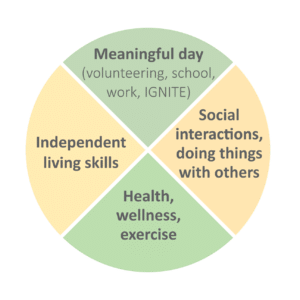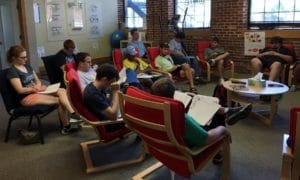How many times this week have you been asked whether you’ve made any New Year’s resolutions? How many times in your life have you been asked about your plans for the future? How would you answer if you had a limited concept of time and limited organizational skills? What is a goal, anyway?!
Individuals with Autism Spectrum Disorder can be taught goal-setting with a very small achievement that can be met in 7 days using the SMART method.
Specific: The goal must be clearly stated, without words such as “more,” “longer,” or “better,” because they are too vague.
Measurable: The goal should be something that can be measured so that success is clear.
Are you motivated? Traditionally, the A stands for attainable, but we prefer “Are you motivated?” so we know why the individual wants to hit their target.
Realistic: Is this something that the individual has the skills and ability to accomplish?
Timely: Can this be accomplished in one week?
What should my goal be?
 Try starting with a pie chart of skills and accomplishments in four life areas. First highlight the area in which the individual feels they have been the most successful and then the one that needs their focus. Create a goal sheet and write down at least two goals per week: one from the area that most needs work (often it’s health and wellness) and the other from the area of their choice.
Try starting with a pie chart of skills and accomplishments in four life areas. First highlight the area in which the individual feels they have been the most successful and then the one that needs their focus. Create a goal sheet and write down at least two goals per week: one from the area that most needs work (often it’s health and wellness) and the other from the area of their choice.
Then the following week, the individual can update their caregiver or family about the target and their progress toward meeting it. If they met the goal, everyone cheers. If it wasn’t not met, the caregiver or family can brainstorm to support the individual in how to break the tasks down into smaller parts to ensure success the next week.

Members of IGNITE work on setting goals.
When goals are too big to accomplish in one week, we call it “Trying to be Superman” and we should work instead to break that goal into baby steps. If the goals are small enough, the individual will become eager to report on their successes and even their unsuccessful attempts each week. They will enjoy both giving and receiving support on hitting their targets. Individuals with ASD can reach big goals (getting a driver’s permit, cooking a meal for their family, registering for college, getting a job, etc.) by breaking the goal into manageable steps, gaining support, and being held accountable. Keep a running log of all of their success, and suddenly, setting a goal is fun!
Mindy Govan is the Director of IGNITE, ASNC’s community centers in Davidson, Greensboro, and Raleigh for young adults with high-functioning autism or Asperger’s Syndrome. IGNITE offers activities, skills training, and educational workshops that foster social, financial, educational, and employment independence for members.
Tags: ASNC, autism, autism behavior, autism education, autism society north carolina, autism society of NC, Autism Society of North Carolina, Autism spectrum, Autism Spectrum Disorder, Autism Spectrum Disorders, autism support, IGNITE
